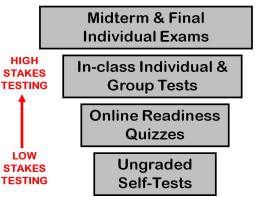|
ABOUT THE LEARNING PHILOSOPHY UNDERLYING THIS
COURSE This course is designed to help you learn the course material in ways that are different from traditional lecture courses. It is based on the following precepts: �
Class time is valuable and
should be a time of active, hands-on, and engaged learning by students, �
Students learn best when
they come to class prepared with sufficient background knowledge (from reading)
to which new material can be added, �
Students learn best when
they have achieved a common "starting place" from which to deepen
their understanding of a concept, � A group of people working together cooperatively can solve complex problems more easily and at a higher level than an individual working alone, and � To achieve success in group activities, each individual has to be perceived as someone with something to offer, and each individual is responsible for preparing and contributing his or her own individual knowledge. Inspired by the above, your learning in this class is designed to take place in different ways. You will do some class work individually, but you will work on other types of activities in an assigned working group or collaborative learning team in which the members help and support each other's efforts to understand and work with the course material. Class time will generally consist of a variety of learning activities: e.g., mini-lectures, individual brief writing exercises, paired or small-group discussions, hands-on small-group problem solving, projects work, etc. etc. Class will also involve different kinds of testing using an approach that will help the course material "sink in" more deeply. The tests will increase in weight from "low stakes" to "high stakes" point totals so you can gain confidence with your understanding of the material as you progress through the different levels of tests from ungraded "self tests" to check your understanding of the readings, to the midterm and final exams. And . . . some of the tests you will take by working together as a group so you can combine knowledge.
To read more about how this way of learning will help you succeed in
our course,
by Henry L. Doediger III, a professor of psychology at
Washington University in St. Louis |
